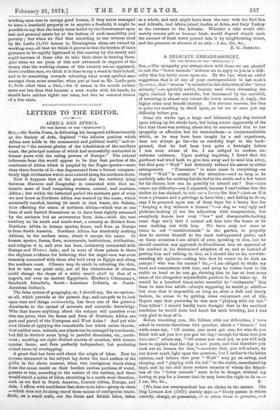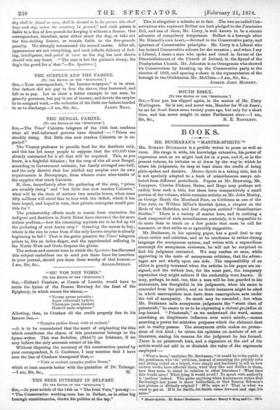A DELICATE EMBARRASSMENT.
[TO THE EDITOR OF THE " SPECTATOR.") Silt,—The sympathy you always show with those we are pleased to call the " lower animals " induces me to apply to you in a diffi- culty that has lately come upon me. By the bye, what an awful suggestion that is of one of your correspondents in last week's Spectator, that " woman " is included in this definition of the " lower animals,"—so specially awful, because used when discussing the right, claimed by the scientific, but denounced by the merciful, of torturing to almost any extent the lower animals, if, haply, the higher order may benefit thereby. For obvious reasons, the idea is quite too startling to dwell upon, so let me at once put my difficulty before you.
Some six weeks ago, a large and hideously ugly dog insisted upon taking up his abode here, but being aware apparently of the fact that there was nothing about him to recommend him to our sympathy or affection but his wretchedness—a recommendation which, as he may have been taught by a sad experience, does not always go far—he so carefully kept in the back- ground, that he had been here quite a fortnight before I was even aware of his, I tun obliged to confess, un- welcome existence. Upon making inquiries, I found that the gardener had tried both to give him away and to send him away, but that poor " Waif " had distinctly refused his assent to either
arrangement. " Possession " in some cases is everything—so clearly " Waif " is master of the situation—and as long as he modestly asks for nothing but his bed in the stable and a few bones for his dinner, how can he possibly be turned out ? But—here comes my difficulty—am I expected, because I can't refuse him the shelter he has claimed, to take out a licence for him?—just as if it were a pleasure and a privilege to have-him ; and failing to do so, may I be pounced upon one of these days for a heavy fine for "keeping a dog without a licence " ?—a dog so very ugly and plebeian-looking (I use the adjectives with compunction, but everybody knows how very "low" and disreputable-looking some dogs are !) that I cannot ask him into the house or be seen walking out with him. We have only met once or twice in our " constitutionals" in the garden, so properly does ho confine himself to the most unfrequented parts ; and on these occasions I am afraid of even speaking to him, lest he should construe any approach to friendliness into an approval of his conduct in his determined adoption of us, and so instead of patting him and talking to him, as I should like to do, notwith- standing his ugliness—asking him how he comes to be such an outcast ? who was his master ? &c.,—I am obliged to shake my head and remonstrate with him, and away he rushes back to his stable as hard as he can go, showing that he has at least some sense of the altogether unjustifiable position he has taken up. It would be a hundred times more merciful to " euthanasia " him than to turn him adrift—always supposing he would go adrif t— but even that is impossible, so long as, after a dull and lonely fashion, he seems to be getting some enjoyment out of life. Report says that yesterday he was seen " playing with his tail." Poor fellow ! I should hardly have thought that in his snubbed condition he would have had heart for such frivolity, but I was very glad to hear of it.
Before troubling you, Mr. Editor, with my difficulties, I have asked in various directions this question about a " licence ;" but while some say, "Of course, you must get one, for who do you think will ask you how you got the dog? enough for them that you have one ;" others say, " Of course you need not, as you will only have to explain that the dog is not yours, and that therefore you took out no licence for him,"—answers that, you will admit, do not throw much light upon the question, but I incline to the latter opinion, and believe that poor " Waif " may go on eating, and sleeping, and " playing with his tail " in the stable, unmolested by boys, and by the still more serious enemies of whom the friend- less of the " lower animals" seem to be in danger, without my having to pay for a licence that he may have the right to do so.— I am, Sir, &c., S. [We fear our correspondent has no choice in the matter. The Dog Licence Act (1867) sternly says :—" Every person in whose custody, charge, or possession, or in whose house or premises, and
dog shall be found or seen, shall be deemed to be the person who shall keep such dog, unless the contrary be proved," and such person is liable to a fine of five pounds for keeping it without a licence. Our correspondent, therefore, must either shoot the dog, or take out the five-shilling licence, or remain liable to the five-pounds penalty. We strongly recommend the second course. After all, appearances are not everything, and such infinite delicacy of feel- ing, intelligence, and gaiete de caur as the dog has now shown should win any heart. " The coat is but the guinea's stamp, the dog's the gowd for a' tbat."—En. Spectator.]



































 Previous page
Previous page